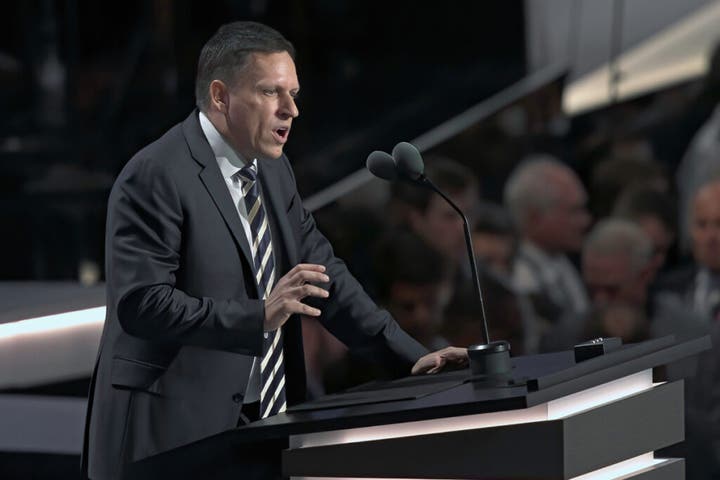
If you've been waiting for A.I. to launch us into a Jetsons-style utopia where Martian real estate is booming, Peter Thiel's here to lower your expectations — with his usual dry bite.
Last week, The New York Times published an edited transcript of its "Interesting Times" podcast episode titled "Peter Thiel and the Antichrist" — yes, that's the actual headline. In the conversation, opinion columnist Ross Douthat spoke with the famously contrarian tech billionaire about A.I., Mars, and why tech-driven salvation may not be just around the corner.
"Just how big a thing do I think A.I. is?" Thiel said. "And my stupid answer is: It's more than a nothing burger, and it's less than the total transformation of our society."
Don't Miss:
- Invest early in CancerVax's breakthrough tech aiming to disrupt a $231B market. Back a bold new approach to cancer treatment with high-growth potential.
- Tired of Grid Failures and Charging Deserts? This Startup Has a Solar Fix and $25M+ in Sales — Now Raising at $3/Share
Instead, he compared it to something that feels oddly grounded: the internet in the late '90s.
For those who remember, the late '90s internet was exciting — but chaotic. Think dial-up tones, Ask Jeeves, and dot-com startups with names like eToilet going public before anyone had figured out how to make money. It changed a lot, sure, but it didn't rewrite the human experience overnight.
That's where Thiel thinks we're at with A.I. today.
"My place holder is that it's roughly on the scale of the internet in the late '90s," he said. "It might be enough to create some great companies. And the internet added maybe a few percentage points to the GDP, maybe 1% to GDP growth every year for 10, 15 years. It added some to productivity."
There's no mistaking this for a love letter to A.I. Thiel isn't calling it revolutionary — he's saying it's a promising tool that, like the early internet, may eventually move the needle. But for now, it's not enough to fix what he sees as the deeper stagnation in society. He wants breakthroughs, not chatbots.
"It's the only thing we have," Thiel said. "It's a little bit unhealthy that it's so unbalanced. This is the only thing we have. I'd like to have more multidimensional progress. I'd like us to be going to Mars. I'd like us to be having cures for dementia. If all we have is A.I., I will take it."
Trending: Named a TIME Best Invention and Backed by 5,000+ Users, Kara's Air-to-Water Pod Cuts Plastic and Costs — And You Can Invest At Just $6.37/Share
He acknowledged that A.I. brings risks — though the conversation didn't go full Terminator. Instead, Douthat asked whether Thiel believed in the idea that once A.I. reaches a certain level of intelligence, it could unlock real-world breakthroughs — like building the rockets to get to Mars, or designing the factories to cure disease.
Thiel wasn't sold.
"Yeah, I somehow don't know if that's been really the gating factor," he said.
In other words, he doesn't think the reason we haven't cured dementia or colonized Mars is because we've been missing a super-smart machine. That kind of logic, he argued, comes from Silicon Valley's near-religious obsession with raw brainpower.
"People are really fixated on I.Q. in Silicon Valley, and that it's all about smart people," he said. "And if you have more smart people, they'll do great things."
See Also: Maximize saving for your retirement and cut down on taxes: Schedule your free call with a financial advisor to start your financial journey – no cost, no obligation.
But he pushed back against that assumption, pointing to a counter-argument that's been floating around in economics circles — that maybe intelligence isn't the magic unlock.
"The economics anti-I.Q. argument is that people actually do worse. The smarter they are, the worse they do. It's just that they don't know how to apply it or our society doesn't know what to do with them, and they don't fit in."
So maybe it's not a matter of building a superintelligent system to solve everything — maybe it's that our systems themselves are broken.
Whether you agree or not, Thiel's take is refreshing in a space filled with both doom prophets and AI evangelists. He's not here to say A.I. will save the world. But he's also not dismissing it as hype.
It's just… not the thing that gets us to Mars.
And for now, that's Thiel's placeholder — even if it's not his final answer.
Read Next: Can you guess how many retire with a $5,000,000 nest egg? The percentage may shock you.
Image: Shutterstock







